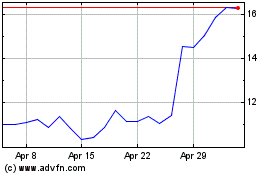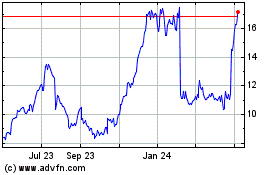Facebook to Viacom Targeted by SEC Regulator's Attack on Dual-Class Shares
February 15 2018 - 5:00PM
Dow Jones News
By Dave Michaels
WASHINGTON -- Corporate titans who control companies through
special classes of stock that give them extra voting power should
have to give up the system after a limited number of years, a
senior Democratic regulator said Thursday.
Companies such as Viacom Inc., Facebook Inc. and Ford Motor Co.
have multiple classes of stock that don't expire until after the
founder or longtime controlling shareholder dies. The practice
"raises the prospect that control over our public companies, and
ultimately of Main Street's retirement savings, will be forever
held by a small, elite group of corporate insiders," Securities and
Exchange Commission member Robert Jackson Jr., a Democrat, said in
remarks prepared for a speech at the University of California
Berkeley Law School.
About 16% of companies that have gone public on U.S. exchanges
since 2013 had at least two classes of stock, according to data
provider Dealogic. Many technology companies have structured their
initial public offerings with dual-class stock in recent years to
give founders a viselike grip on the business. Snap Inc., for
instance, gave new shareholders no voting rights whatsoever when it
went public last year.
The founders of the Snapchat parent, Evan Spiegel and Robert
Murphy, control the company through class C shares that give them
10 votes per share. The stock only loses its supervoting power nine
months after their deaths, according to Snap's corporate
charter.
Class B shares held by Facebook founder Mark Zuckerberg, which
grant him 10 votes per share, convert to common, one-vote shares
three years after his death or -- under more complex circumstances
-- if he resigns, according to Facebook's corporate charter.
Such outsize voting power gives controlling shareholders
dominance over all decisions, ranging from the election of
directors to whether to sell the company someday.
News Corp., the owner of The Wall Street Journal's parent, Dow
Jones & Co., has two classes of shares, which allow Rupert
Murdoch and his family to maintain greater influence over the media
company.
An investor backlash against Snap's deal prompted the keepers of
the S&P 500 to say they would block newcomers with multiple
classes of stock from joining their flagship index. Barring those
companies from prominent indexes could reduce demand for their
stock from increasingly popular index funds.
Dual-class stock may benefit investors early in a company's
life, when the visionary who launched it needs freedom to build the
business without outside pressure from stockholders, Mr. Jackson
said. But that benefit wanes over time, he said. His staff's
analysis showed that firms with never-ending dual-class stock trade
at a discount to ones that retire the structure later in the
company's life.
The solution isn't banning companies with dual-class stock from
the major indexes, as S&P did, Mr. Jackson said. That would
hurt Main Street investors who invest through passive funds and
stand to miss out on those companies' growth, he said.
Instead, he said in his first speech since joining the SEC, U.S.
stock exchanges should force companies to retire their dual-class
share structure after a period of time.
He declined to say how quickly that should happen, saying other
critics have proposed ideas. "By giving investors more say in the
governance of their companies, we can help protect them from
managers who would misuse dual-class to extract value rather than
build it," he said.
Exchanges, while regulated by the SEC, don't have to follow the
recommendations of a single commissioner. Democratic SEC
Commissioner Kara Stein also criticized dual-class shares in a
speech this week, saying they disrupt the relationship that should
exist between companies and shareholders.
Write to Dave Michaels at dave.michaels@wsj.com
(END) Dow Jones Newswires
February 15, 2018 16:45 ET (21:45 GMT)
Copyright (c) 2018 Dow Jones & Company, Inc.
Snap (NYSE:SNAP)
Historical Stock Chart
From Mar 2024 to Apr 2024

Snap (NYSE:SNAP)
Historical Stock Chart
From Apr 2023 to Apr 2024
